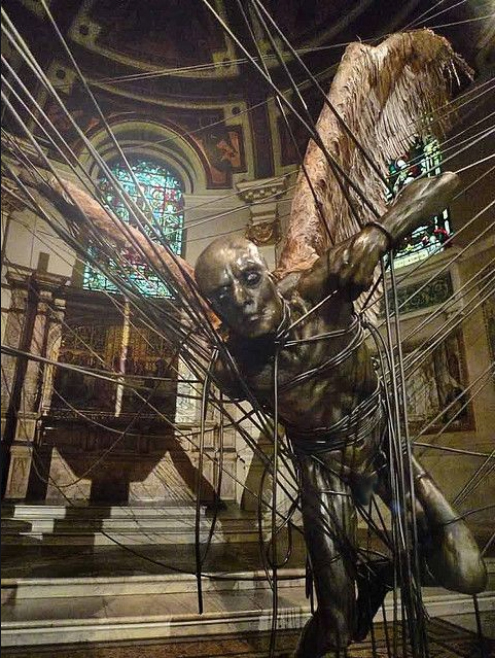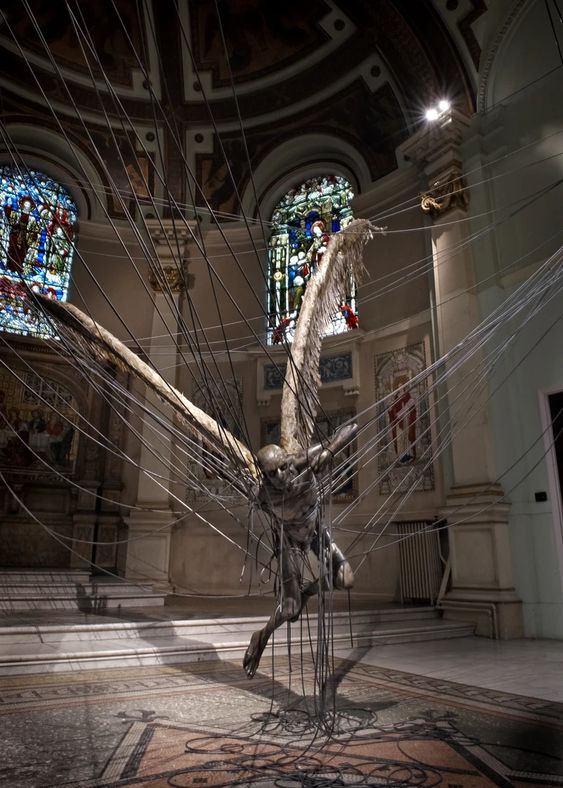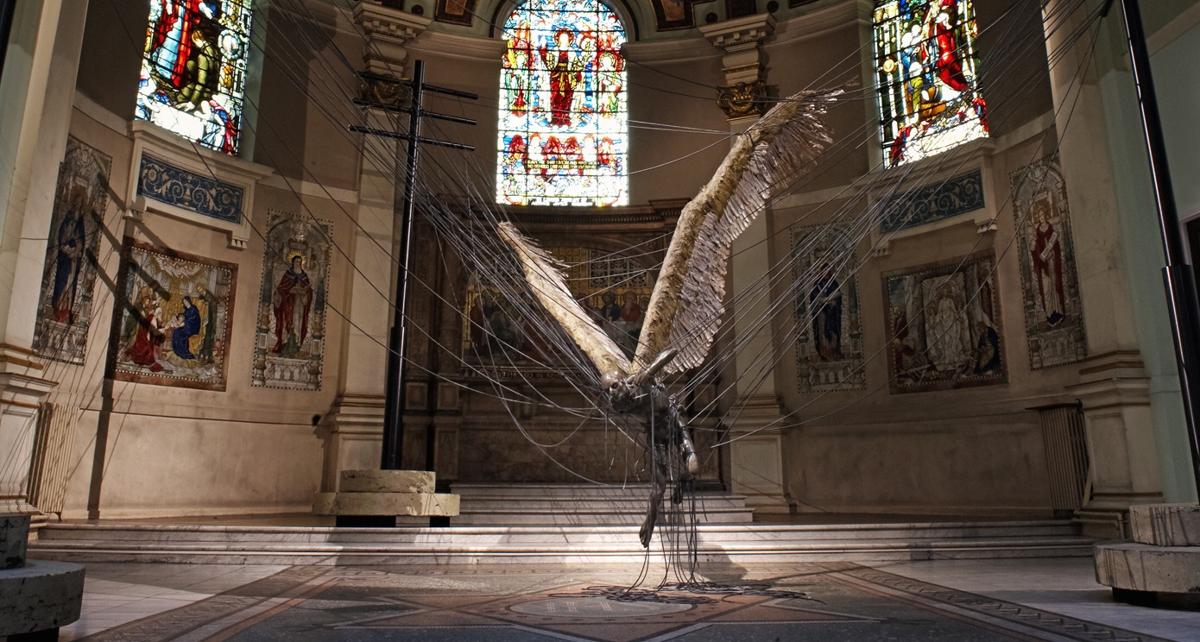February 24: “I Have Given You Authority Over the Enemy”
♫ Music:
Day 8 - Wednesday, February 24
Title: “I HAVE GIVEN YOU AUTHORITY OVER THE ENEMY”
Scripture: Luke 10:17-20
The seventy returned with joy, saying, “Lord, even the demons are subject to us in Your name.” And He said to them, “I was watching Satan fall from heaven like lightning. Behold, I have given you authority to tread on serpents and scorpions, and over all the power of the enemy, and nothing will injure you. Nevertheless do not rejoice in this, that the spirits are subject to you, but rejoice that your names are recorded in heaven.”
Poetry:
Miracle in the Collection Plate
by Marilyn Nelson
Rev. Christopher Rush, 1850
Brothers and sisters, we know why we’re here
this evening. The sad news has traveled fast
of Brother James’s capture. For three years
he lived amongst us, tasting happiness.
His wife and child are here with us tonight.
God bless you, Sister. Without a goodbye,
James was handcuffed, and shoved on a steamboat
to Baltimore, to be sold—legally!
Neighbors, we know that upright, decent man:
James Hamlet: a loving husband, father, friend.
Many of us would gladly risk the fine
or prison sentence, if we could help him.
My friends, all is not lost! It’s not too late!
We are told that Brother James may be redeemed!
His buyer will sell him! But we cannot wait:
we need eight hundred dollars to free him.
Eight hundred. I know every penny counts,
living from widow’s mite to widow’s mite.
But with God’s help, we can raise that enormous
amount!
Let’s make a miracle on the collection plate!
I HAVE GIVEN YOU AUTHORITY OVER THE ENEMY
The disciples’ authority over the demonic is real. They acknowledge that they exercise powerful ministry in Jesus’ name. But Jesus sees through this deference. He counsels them that the power they enjoy wielding in subjecting spirits to themselves is nothing to the rejoicing they should pursue in being subjects of heaven. That is, their being authorized as agents of Jesus signifies a positive orientation to a reality greater than busy work swatting away evil spirits. Their names are recorded in heaven. This is heaven, the place of God’s rule, from which Jesus has seen Satan cast down.
Paul Fryer’s sculpture gives us an interpretative challenge. Is Lucifer bound under the authority of a more powerful name? (The 2008 installation of sculpted form suspended in telegraph wire is in the former church of Holy Trinity in Marylebone, London) Or is it rather that, descended from heaven, this fallen angel wreaks havoc in destructively enmeshing himself in the mundane of our present age – literally causing our wires to be crossed as accusations and even celebrations puff our pride in our own name and so keep us from recognizing heaven and the name of Jesus to which we must be bound, even binding ourselves to this Son of Man who will be bound and crucified for our sakes?
Marilyn Nelson’s poem conjures names also, envisioning captivity and freedom. She takes up the purported sermon of one of the pioneering bishops of the African Methodist Episcopal Church, Christopher Rush, appealing for funds to redeem the misapprehended James Hamlet.
We can readily see that enslavement of Black Americans in the antebellum period is a manifestation of demonic wickedness. A perversion of human authority, whereby humans are owned in perpetuity by other fellow humans, distinguished by skin color. This wickedness compounded by the authority of legislation in the Fugitive Slave Law (1850) leads to free black men, like James Hamlet, being swept up, bound, and liable to transportation into a living death beyond wife, children, friends, church, and freedom, without voice to assert their own name and belonging. We might even, today, feel that in following Jesus through Lent we can, with the disciples, rejoice that the viciousness of slavery is well behind us, bound into the history books.
Just so, lest we lose sight of heaven in self-congratulation, we can attend to Chino Amobi’s powerful soundscape ‘Blood of the Covenant’ from the ironically named album Paradiso. Pulsating electronic beats jostle with the jarring sounds of sirens, helicopters, chanting voices, grunts and screams spliced with a prosaic radio DJ purrs ‘Welcome to Paradiso’ when it sounds anything but paradisal. The track ends with an ambiguous jump from the beats to a distorted and lighter if unhinged vocal perhaps offering ‘free’[dom?] conflated with a menacing warning about ‘your mind’. In short, this is a hellish Paradise. Avowedly influenced by Hieronymus Bosch’s ‘Garden of Earthly Delights,’ Amobi, creates his sonic pastiche on a worldwide scale, both in musical influences and sampling sources for his ‘NonWorldwide Radio’. How challenging for those of us who suppose ourselves world citizens, informed Christian thinkers, with proposals for policies, and spiritual disciplines that would improve the world, to see in Nelson’s poem that the redress to evil is in the small miracle of collected mites. Challenging, further, that we need Nelson to write this poem today when the hellish soundscape of violence and racialized distortion of our being human name bearers still plays out in our lives as we deal with (or trade away) one another in our contested social settings.
Jesus bids us, as his disciples, see our names in heaven as we belong to and follow him, not as we make a name for ourselves in deploying his authority for our glory. This scripture combined with poem, sound and sight invites us to rejoice in Satan’s downfall while recognizing that we are not in heaven yet. Our Lenten lives are hellishly distorted and vulnerable. Walking with Jesus this Lent bids us see our place of discipleship as shot through with demonically misconstrued social communications and prejudices. We see our enmeshment in the Satanically crossed wires. And even so, we accept the divine commission to overcome these enmities in Jesus’ name, so that we can, in small ways, oppose Satan, and bear witness to the heaven that both awaits and presently comes in the good work that Jesus accomplishes in binding our names to his eternal redemption.
Prayer:
Deliver us from the Evil One, Lord God, as we humbly ascribe all power, and authority, and honor to your Son, who for our sake endured temptation, trial and death–the lot of a fallen and distorted humanity–to offer us new heavenly names in his Kingdom. May we, by your Spirit, look to your Son to guide us into renewed paths of communication and sharing with others of the small goods around us, in whose name, Jesus, we pray,
Amen
Dr. Andy Draycott
Associate Professor of Theology and Christian Ethics
Talbot School of Theology
Biola University
For more information about the artwork, music, and poetry selected for this day, we have provided resources under the “About” tab located next to the “Devotional” tab.
Artwork & Artist:
Lucifer, Morning Star (several installation views)
Paul Fryer
2008
Wax sculpture, concrete, aluminum, feathers, rubber cord
Holy Trinity Church
Marylebone, Westminster, England
This piece was part of a solo exhibition entitled Let There Be More Light. Artist Paul Fryer’s Lucifer, Morning Star was installed in the Holy Trinity Church in Marylebone, Westminster. The church has not been used for worship services in nearly forty years, making it a haunting abode for this grotesquely beautiful installation. The dramatic lighting casts Lucifer in dramatic shadows, and his tarnished, corpse-like oily skin is permeated with the antiquity of the ages and the torture of life-within-death. Fryer’s work perfectly encapsulates the image of the angel with the dark soul, cast out of heaven, with huge wings ensnared in power lines.
https://www.iloboyou.com/creepy-lucifer-sculpture-paul-frye/
https://widowcranky.com/2017/07/22/morning-star-lucifer-paul-fryer/
About the Artist:
Paul Fryer (b. 1963) is a British artist who lives and works in London. He is a visual artist who regularly employs electronic media and sculpture to create installation pieces in unusual exhibition sites. He briefly studied at the Leeds College of Art in the 1980s, and in the following years worked as a disc jockey, musician, and music producer until he moved to London in 1996 to work as a graphic designer and gallery consultant. In 2005, he decided to dedicate himself to his artistic practice. He often collaborates with physicist and engineer Colin Dancer to create complex electronic and mechanical works using the latest scientific research and technology. He also creates gothic and sometimes gruesome figures in wax, highlighting the links between hyper-realism and scientific observation. He has exhibited extensively in solo and group shows in the past decade in the United Kingdom and abroad, including: The Gucci Museum, Florence; Guido Costa Projects, Turin; Museum of Modern Art, Baku; Glasstress, Venice; FAS Contemporary, Rook & Raven; and Somerset House in London.
http://glasstress.org/my-product/paul-fryer/#1482314626436-0d1da5c7-e28ad6c2-e1a94f56-a194
https://paulfryer.net/
https://www.iloboyou.com/creepy-lucifer-sculpture-paul-frye/
https://widowcranky.com/2017/07/22/morning-star-lucifer-paul-fryer/
About the Music:
“BLOOD OF THE COVENANT” from the album PARADISO
About the Composer/Performer:
Chino Amobi (b. 1984) is an American experimental electronic musician, contemporary artist, director, and co-founder of the independent record label NON Worldwide. He has worked in the fields of painting and sound design in the past and has released albums like Airport Music for Black Folk (2016) and Paradiso (2017), which explore themes of intercontinental security, post-apocalyptic narratives, and Afro-pessimism. As a child, Amobi pursued art and learned to make music through software like the first-generation PlayStation game MTV Music Generator, and Apple’s GarageBand. In high school, Amobi made hip-hop music with his brother, who is now a rapper under the name Chichi the Eternal. Amobi graduated from Virginia Commonwealth University with a B.F.A (2009) and an M.F.A. (2019) in graphic design.
https://en.wikipedia.org/wiki/Chino_Amobi
About the Poem:
In 1850 the U.S. Congress passed the Fugitive Slave Law, which made any federal marshal or other official who did not arrest an alleged runaway slave liable to a fine of $1,000. Law enforcement officials had a duty to arrest anyone suspected of being a runaway slave on no more evidence than a claimant’s sworn testimony of ownership. The suspected slave could not ask for a jury trial or testify on his or her own behalf. In addition, any person aiding a runaway slave by providing food or shelter was subject to six months imprisonment and a $1,000 fine. Officers who captured a fugitive slave were entitled to a bonus. Slave owners only needed to supply an affidavit to a federal marshal to capture an escaped slave. This law led to many free Blacks being conscripted into slavery, as they had no rights in court and could not defend themselves against accusations. James Hamlet was the first fugitive arrested under the new law. His African American and abolitionist friends raised the money necessary to purchase his freedom.
About the Poet:
Marilyn Nelson (b. 1946), a three-time finalist for the National Book Award, is one of America’s most celebrated poets. She is the author or translator of seventeen poetry books for adults and children, five chapbooks, and in 2014 she published a memoir entitled How I Discovered Poetry—a series of fifty poems about growing up in the 1950s in a military family. She is a professor emeritus at the University of Connecticut and the former poet laureate of Connecticut. She earned a B.A. from the University of California, Davis, an M.A. from the University of Pennsylvania in 1970, and a Ph.D. from the University of Minnesota in 1979. Her poetry collections include The Homeplace and The Fields Of Praise: New And Selected Poems. Her honors include two NEA creative writing fellowships, the 1990 Connecticut Arts Award, a Fulbright Teaching Fellowship, and a 2001 Guggenheim Fellowship.
https://www.poetryfoundation.org/poets/marilyn-nelson
https://en.wikipedia.org/wiki/Marilyn_Nelson
About the Devotion Author:
Dr. Andy Draycott
Associate Professor of Theology and Christian Ethics
Talbot School of Theology
Biola University
Dr. Andy Draycott is a British immigrant scholar living in Southern California with his family. He is a lifelong fan of Charles Schultz’s Peanuts, enjoys reading novels and social history, and also enjoys cycling, running, and baking. Currently, he is an Associate Professor of Theology and Christian Ethics at Biola’s Talbot School of Theology. He counts God’s blessings in Christ, in local church, in family life, and in delightful work colleagues. His teaching and research on John Bunyan’s The Pilgrim’s Progress can be sampled at ProfessorPilgrimsProgress.com.


